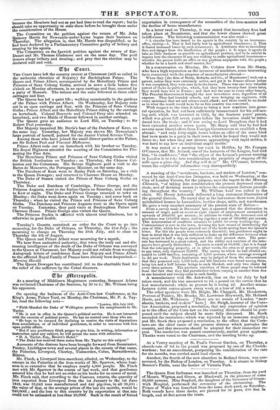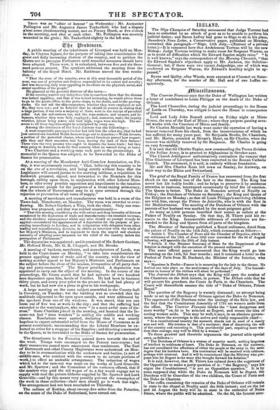Zbe glattropolis.
At a meeting of Middlesex Magistrates yesterday, Sergeant Adams was reelected Chairman of the Sessions, by 20 to 2; Mr. Witham being his opponent.
On opening the business of the Anti-Corn-law Conference, at the King's Arms, Palace Yard, on Monday, the Chairman, Mr. P. A. Tay- lor, read the following note—
London, 16th July 1842. "Field-Marshal the Duke of Wellington presents his compliments to Mr. Taylor.
"He is not in office in the Queen's political service. He is not intrusted with the exercise of political power. He has no control over those who are. "He begs to be excused for declining to receive the visits of deputations from associations, or of individual gentlemen, in order to converse with him upon public affairs. But if any gentlemen think proper to give him, in writing, information or instruction upon any subject, he will peruse the same with attention.
"D. A. Taylor, Esq., Brown's Hotel." "The Duke has received three notes from Mr. Taylor on this subject."
Accounts of the distress have been brought forward from Beaminster, Paisley, Linlithgow town and several places in the county of that name, the Potteries, Liverpool, Chorley, Todmorden, Colne, Barnoldswick, Bilston.
Mr. Finch, a Liverpool iron-merchant, alluded, on Wednesday, to the emente in the Potteries at the iron-works of Mr. Sparrow, whose busi- ness is so extensive that he employs nearly 4,000 people. Mr. Finch met with Mr. Sparrow in the course of last week, and that gentleman assured him that he had not an order on his books for an ounce of metal. Mr. Finch said, that according to the Customs returns, the quantity of iron exported from Liverpool from the 1st January to the 1st June 1842, was 35,043 tons manufactured and 648 pig-iron, in all 39,691 : the value of that, at the average prices of the last six months, would be 240,0001.; and the loss to this country by its exportation at that rate could not be estimated at less than 20,0001. Such is the result of forced exportation in consequence of the necessities of the iron-masters and the decline of home manufactures.
In a letter read on Thursday, it was stated that incendiary fires had taken place at Beaminster, and that the lower classes showed great indifference. The following communication was also read-.-
"A circular has been issued to its agents in the country by an insurance- office, stating—I. That it had lately lost by agricultural insurances ; 2. That it feared increased losses by such insurances ; 3. Attributes this to incendiary fires and danger from the disaffection of the people ; 4. It urges it agents to take as little business as possible on agricultural produce, and to be careful in inquiry into the character of any one wishing to make agricultural insurances— whether the person holds an office or any position unpopular with the people; whether be be a harsh and cruel master, Sic."
In a conversation on Monday, Mr. Cobden drew from Mr. Sharp, who has a high reputation as the inventor of machines, some interesting facts connected with the progress of manufactures abroad— When they [the firm of Sharp, Roberts, and Co., of Manchester] took out a patent, unless they were extremely active, and got it to France almost before it was completed, they were sure to he the losers. There was one very valuable patent of theirs in particular, which, had they been twenty-four hours later, they would have lost in France; and that was the case in every other branch. The Prussian Government brought the new inventions over, regardless of all expense. They had founded schools, and were bringing up engineers, with every assistance that art and science could afford; and there could be no doubt as to what the result would be as far as this country was concerned. With respect to the time it takes to bring a new machine into gene- ral operation, he had not been sufficiently remunerated for his self-act- ing mill, which was invented in 1825, by the fourteen years' patent, which was given full seven years before the invention could be intro- duced into the trade ; and it was owing to Lord Brougham that it had been extended another seven years. Mr. Sharp said that he had had several most liberal offers from Foreign Governments to establish a firm abroad; "and only forty-eight hours before an offer of the same kind had been made to a party in their town, which he hoped they would not listen to ; but when they saw distress approaching with rapid strides, it was hard to say how an individual might decide."
It was stated at a meeting last week in Halifax, by Mr. Feargas O'Connor, that Mr. Acland, one of the lecturers of the League, had told him, "in confidence," that "the object of the League's present meeting in London is to take into consideration the propriety of stopping all the mills upon a given day. And they will do it." Mr. O'Connor, however, treats the confidential information very disrespectfully.
A meeting of the "merchants, bankers, and traders of London," con- vened by the Anti-Corn-law Delegates, was held on Wednesday, at the City of London Tavern, for the purpose, says the report in the Morning Chronicle, "of taking into consideration the present depressed state of trade, and of devising means to relieve the consequent distress prevail- ing throughout the country." Mr. William Leaf was called to the chair. Mr. Henry Ashworth delivered a long statement illustrative of the general distress. He stated that at the last census there were 23,604 uninhabited houses in Lancashire, besides shops, mills, and warehouses. He gave a very succinct summary of the present state of Bolton— From a survey made in December last, it appeared that the diminution in amount of wages paid on seven or eight classes of employment amounted to upwards of 200,000/. per annum ; in addition to which, the increased cost of provisions was 118,000/. more, making together a sum of 320,000/. per annum. This deterioration of condition amounts to 1,000/. for every working-day. .A. Commissioner is now in the town, devising the best means of distributing the sum of 500/., which has been granted out of the funds arising from the Queen's letter. For this the people were extremely thankful ; but gentlemen ought to bear in mind that it was only sufficient to make up the difference between what they earned in half a day, as compared with their present state. The poor- rate has increased to a great extent, and the ability ant numbers of the rate- payers have greatly diminished. The town is rated at 84,000!.; but it is found that the rate-paying property, or in other words, the owners of property able to pay rates, only represent 31,000/. The survey to which he had alluded ex- tended to 1,000 families, consisting of 5,300 persons, whose earnings averaged ls. 2d. per week. Their destitution may be judged of from the circumstance that they possessed only 1,553 beds, and 466 blankets were found among them, being ten and a half human beings to each blanket, and only two chairs for every three persons. The previous condition of these people may be inferred from thel fact that they had pawnbroker-tickets varying in number from five to one hundred and twenty-nine in each family.
A manufacturer told Mr. Ashworth, that on the 1st July he had taken stock, and his loss amounted to Id. a pound on the cotton that he had manufactured ; while at present he is losing 2d. Another manu- factures 6,000 cotton-pieces every week at a loss of 831. a week. The other speakers were Mr. Bright, Mr. Chappell, Mr. Henderson, Provost of Paisley, Mr. Brooks, Mr. Lawrence Heyworth, Mr. Holland Hoole, and Mr. Wilkinson. [There are no names of London "mer- chants, bankers, and traders" here.] Dr. Sleigh, lecturer of the Corn- law Association, proposed a resolution, that any expression of opinion as to the effect of the Corn-law on the existing distress should be post- poned until the subject should be more fully discussed. Mr. Stock seconded the resolution ; which was rejected by an immense majority ; and Mr. Stock then proposed a resolution, to the effect that the Corn- laws are the chief cause of the present distress which pervades the country, and that measures should be adopted for their immediate re- peal. The resolution was passed unanimously, amidst great applause.. Thanks were voted to the Chairman, and the meeting broke up.
At a Vestry meeting of St. Paul's Covent Garden, on Thursday, a church-rate of 9d. in the pound was proposed by one of the Church- wardens ; but an amendment, postponing the consideration of the rate for six months, was carried amid load cheers.
Another, the fourth of the new churches in Bethnal Green, was con- secrated, by the Bishop of London, on Tuesday. It is situate in Bishop Bonner's Fields, near the border of Victoria Park.
The Queen East Indiaman was launched on Thursday, from the yard of Messrs. Wigram and Green, at Blackwell, in the presence of some 30,000 persons. Miss Stopford, the daughter of the Governor of Green- wich Hospital, performed the ceremony of the christening. The Prince of Wales was launched from the same dock-yard, on Saturday. Both vessels have three decks are pierced for 52 guns, 210 feet in length, and 40 feet across the beam.
There was an "edam of honour" on Wednesday : Mr. Alexander Pollington and Mr. Augustus James Tankerfield, who had a dispute about some electioneering matter, met on Putney Heath, at five o'clock in the morning, and shot at each other. Mr. Pollington was severely -wounded in the groin ; Mr. Tankerfield slightly in the left arm.



























 Previous page
Previous page